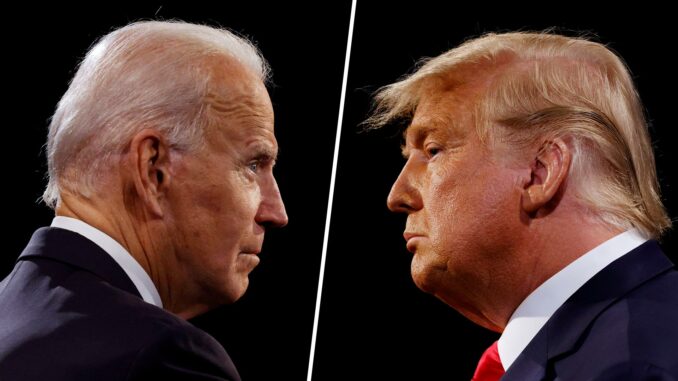
In reflecting on the Biden-Trump rematch and its place within the historical context of presidential rematches, it becomes evident that electoral dynamics and political rivalries have long shaped the American political landscape.

A YouGov-University of Massachusetts Amherst poll conducted in January found that 45% of Americans believe a Biden-Trump rematch is bad for the country. Another 26% say the rematch is neither good nor bad, while just 29% view it as good for the nation.
Following the primaries on March 12th, 2024, Trump and Biden emerged as the presumptive presidential candidates for their respective parties, setting the stage for an inevitable rematch between them.
Based on FiveThirtyEight’s most recent polling averages, Biden’s approval rating is currently at 38.1%, while Trump’s stands slightly higher at 42.6%. This indicates that both individuals are not favored by a majority of Americans.
While the upcoming Trump-Biden rematch in November 2024 bears some similarity to a singular rematch from the 19th century, there exist several other instances of presidential rematches that transpired much earlier in United States history.
Seventy-two years ago, in 1952, Republican Dwight D. Eisenhower secured a landslide victory by winning 39 out of 48 states over Illinois Democratic Governor Adlai Stevenson II, thus becoming the first Republican president in 20 years. In 1956, as the incumbent president, Eisenhower won reelection by an even larger margin, defeating Democrat Governor Adlai Stevenson II once again. This time, Eisenhower won 41 states out of 48, clinching 57% of the popular vote. Stevenson managed to carry only six Southern states and the border state of Missouri, making him the first losing candidate since William Jennings Bryan in 1900 to secure Missouri.
The election of 1888 and its subsequent rematch in 1892 serve as a more fitting parallel to the upcoming Biden-Trump rematch in November 2024. In 1888, former Republican Senator from Indiana, Benjamin Harrison, triumphed over the incumbent Democratic President, Grover Cleveland. However, in the 1892 election, Cleveland staged a comeback and reclaimed victory over Harrison. Notably, Grover Cleveland held the presidency as both the 22nd and 24th president, winning elections in 1884 and 1892. His tenure marks a unique distinction as he remains the only president to serve two non-consecutive terms.
THE OTHER REMATCHES:
Former Ohio Republican congressman and governor William McKinley defeated Democrat William Jennings Bryan in both the 1896 and 1900 presidential elections. Bryan ran for president in 1896, 1900, and 1908 as a Democrat.
In 1836, Martin Van Buren, who served as Vice President under Andrew Jackson, secured victory for the Democrats by defeating William Henry Harrison of the Whig Party. However, in a rematch four years later in 1841, Harrison emerged triumphant and assumed the presidency.
John Quincy Adams and Andrew Jackson competed twice for the presidency. Initially, in 1824, Adams emerged victorious, while in 1828, Jackson unseated the incumbent Adams to assume the presidency.
Then there was John Adams, a Federalist who served as the nation’s second president, and Thomas Jefferson, its third, representing the Democratic-Republican party. They competed for the presidency during the first contested presidential election to succeed George Washington in 1796. Adams emerged victorious, with Jefferson elected as vice president. Four years later, Jefferson ran against and defeated the incumbent Adams.
In reflecting on the Biden-Trump rematch and its place within the historical context of presidential rematches, it becomes evident that electoral dynamics and political rivalries have long shaped the American political landscape. From the early contests between John Adams and Thomas Jefferson to the more recent battles between William McKinley and William Jennings Bryan, these rematches underscore the enduring nature of democracy and the ever-evolving nature of political competition. As we anticipate the outcome of the Biden-Trump rematch in November 2024, history continues to provide valuable insights into the intricacies of presidential elections and the resilience of the American electoral process.
(Dave Makkar is a social activist)





Be the first to comment